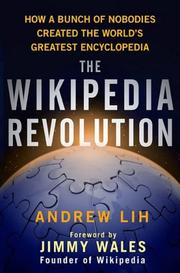| Listing 1 - 10 of 428 | << page >> |
Sort by
|

ISBN: 9781401303716 1401303714 Year: 2009 Publisher: New York, N.Y. Hyperion
Abstract | Keywords | Export | Availability | Bookmark
 Loading...
Loading...Choose an application
- Reference Manager
- EndNote
- RefWorks (Direct export to RefWorks)
A Wikipedia expert tells the inside story of the trailblazing--and incredibly popular--open source encyclopedia.
Book
ISBN: 9789045015699 Year: 2010 Publisher: Amsterdam,
Abstract | Keywords | Export | Availability | Bookmark
 Loading...
Loading...Choose an application
- Reference Manager
- EndNote
- RefWorks (Direct export to RefWorks)
History of Europe --- politieke geschiedenis --- nieuwe tijd --- anno 1500-1799 --- East and West --- Oosten en Westen --- Orient et occident --- Vienna (Austria) --- History --- Siege, 1683 --- Turkey --- Foreign relations --- Europe --- 1648-1715 --- Relations --- Ottoman Empire, 1288-1918

ISBN: 0300040725 Year: 1990 Publisher: New Haven, Conn. Yale University Press
Abstract | Keywords | Export | Availability | Bookmark
 Loading...
Loading...Choose an application
- Reference Manager
- EndNote
- RefWorks (Direct export to RefWorks)
sculpting --- History --- Sculpture --- Antiquity --- Sculpture, Greek --- Sculpture grecque --- Greek sculpture --- Griekse beeldhouwkunst --- antieke beeldhouwkunst
Book
ISBN: 9780500051719 0500051712 Year: 2012 Publisher: London Thames & Hudson
Abstract | Keywords | Export | Availability | Bookmark
 Loading...
Loading...Choose an application
- Reference Manager
- EndNote
- RefWorks (Direct export to RefWorks)
Champollion, Jean-François --- Philologists --- Egyptologists --- Egyptian language --- Writing, Hieroglyphic. --- Champollion, Jean-François,
Book
ISBN: 9789029086219 Year: 2012 Publisher: Amsterdam Meulenhoff
Abstract | Keywords | Export | Availability | Bookmark
 Loading...
Loading...Choose an application
- Reference Manager
- EndNote
- RefWorks (Direct export to RefWorks)
Tegenwoordig zijn we niemand als we niet op Facebook, LinkedIn of Google+ zitten, of als we er niet op los twitteren. Ons leven speelt zich af op internet. Daar ontmoet je je echte vrienden.De internetgoeroe Andrew Keen waarschuwt dat de gekte rond de sociale media zowel onze individuele privacy als onze vrijheid in gevaar brengt. Sociale media zijn, in tegenstelling tot wat iedereen denkt, geen waarborg voor intensere vriendschappen, betere contacten en een mooiere samenleving. En we kunnen ook niet allemaal onze authentieke identiteit op internet realiseren.Iedereen die zich wel eens heeft afgevraagd wat het doel is van Facebook of Twitter, zal na lezing van dit boek anders gaan denken over een wereld die afhankelijk is van het sociale netwerk, een wereld waar we hoe dan ook middenin leven.Bron : http://www.meulenhoff.nl
sociale netwerken --- sociale media --- Computer architecture. Operating systems --- Social psychology --- Internet --- Sociale media --- Privacybescherming --- Identiteit --- Information (gestion) Informatie (management) --- Réseaux Netwerken --- 004.773 --- digitale revolutie --- internet --- E-cultuur --- berichtenuitwisseling --- PXL-Central Office 2014 --- sociale aspecten --- psychologische aspecten --- communicatiemiddelen --- Provincie West-Vlaanderen
Book
ISBN: 9781594204968 1594204969 Year: 2015 Publisher: New York: Penguin press,
Abstract | Keywords | Export | Availability | Bookmark
 Loading...
Loading...Choose an application
- Reference Manager
- EndNote
- RefWorks (Direct export to RefWorks)
When Martin Luther posted his "theses" on the door of the Wittenberg church in 1517, protesting corrupt practices, he was virtually unknown. Within months, his ideas spread across Germany, then all of Europe; within years, their author was not just famous, but infamous, responsible for catalyzing the violent wave of religious reform that would come to be known as the Protestant Reformation and engulfing Europe in decades of bloody war. Luther came of age with the printing press, and the path to glory of neither one was obvious to the casual observer of the time. Printing was, and is, a risky business--the questions were how to know how much to print and how to get there before the competition. Pettegree illustrates Luther's great gifts not simply as a theologian, but as a communicator, indeed, as the world's first mass-media figure, its first brand. He recognized the power of pamphlets, written in the colloquial German of everyday people, to win the battle of ideas. But that wasn't enough--not just words, but the medium itself was the message. Fatefully, Luther had a partner in the form of artist and businessman Lucas Cranach, who together with Wittenberg's printers created the distinctive look of Luther's pamphlets. Together, Luther and Cranach created a product that spread like wildfire--it was both incredibly successful and widely imitated. Soon Germany was overwhelmed by a blizzard of pamphlets, with Wittenberg at its heart; the Reformation itself would blaze on for more than a hundred years. This book fuses the history of religion, of printing, and of capitalism--the literal marketplace of ideas--into one enthralling story, revolutionizing our understanding of one of the pivotal figures and eras in human history.--Adapted from book jacket.
Book history --- Luther, Martin --- Reformation --- Christian literature --- Printing --- 2 LUTHER, MARTIN --- Printing, Practical --- Typography --- Graphic arts --- Christian writings --- Christianity and literature --- Literature --- Religious literature --- Publishing --- History --- Godsdienst. Theologie--LUTHER, MARTIN --- Luther, Martin, --- Luter, Martinos, --- Lutr, Martin, --- Лютер, Мартін, --- Li︠u︡ter, Martin, --- Luter, Marcin, --- Luther, Maarten, --- Lutero, Martín, --- Luther, Martinus, --- Luther, Márton, --- Luther, Martti, --- Luther, Martí, --- Lutʻŏ, --- Lūtœ̄, Mātīn, --- D. M. L. A., --- Luters, Mārtiņš, --- Luter, Marṭin, --- Luther, Marczin, --- Rutā, Marutin, --- לוטהער, מארטין --- לוטהער, מארטין, --- לותר --- 路德马丁, --- Luttar Cāstiriyār, --- Cāstiriyār, Luttar, --- ルター マルティン, --- Лютэр, Марцін, --- Li︠u︡tėr, Martsin, --- Лутер, Мартин, --- Liuteris, Martynas, --- Wittenberg (Saxony-Anhalt, Germany) --- Germany --- Church history --- Joerg, Junker, --- 2 LUTHER, MARTIN Godsdienst. Theologie--LUTHER, MARTIN --- Lutawm, Matees, --- Lu-toe, Ma-ti, --- Lotera, Martin, --- Lusā, Mātaṅʻ, --- Lūthœ̄, Mātin, --- Luther, Maarten --- Lutherus, Martinus --- Lutero, Martin --- Lutherstadt Wittenberg (Germany) --- Wittenberg --- Wittenberg (Halle, Germany) --- Wittenberg (Saxony-Anhalt Germany) --- Reformation - Germany. --- Christian literature - Publishing - Germany - History - 16th century --- Printing - Germany - Wittenberg (Saxony-Anhalt, Germany) - History - 16th century --- Luther, Martin, - 1483-1546 --- Germany - Church history - 16th century --- Wittenberg (Saxony-Anhalt Germany) - History - 16th century --- Luta, Martin, --- Lute̳e̳r, Martẽ, --- Lūthar, Mārṭin,
Book
ISBN: 9027455309 9789027455307 Year: 1985 Publisher: Antwerpen Spectrum
Abstract | Keywords | Export | Availability | Bookmark
 Loading...
Loading...Choose an application
- Reference Manager
- EndNote
- RefWorks (Direct export to RefWorks)
Polemology --- 341.67 --- 855 Oorlogsvoering --- 861 Vredesbeweging --- 871 Conventionele wapens --- 873 Wapenbeheersing --- Ontwapening. Beperking ,vermindering van bewapening. Salt akkoorden. ABC akkoorden. Non-proliferatieverdragen. Oorlogspreventie --- 341.67 Ontwapening. Beperking ,vermindering van bewapening. Salt akkoorden. ABC akkoorden. Non-proliferatieverdragen. Oorlogspreventie

ISBN: 1859282334 Year: 2000 Publisher: Aldershot ; Vermont Ashgate
Abstract | Keywords | Export | Availability | Bookmark
 Loading...
Loading...Choose an application
- Reference Manager
- EndNote
- RefWorks (Direct export to RefWorks)
Graphics industry --- 094:5 --- 655.411 --- 027.1 --- Oude en merkwaardige drukken. Kostbare en zeldzame boeken. Preciosa en rariora-:-Wiskunde. Natuurwetenschappen --- Wetenschappelijke uitgeverij --- Particuliere bibliotheken. Familiebibliotheken. Personenbibliotheken --- Science --- -Natural science --- Science of science --- Sciences --- Bibliography --- -Oude en merkwaardige drukken. Kostbare en zeldzame boeken. Preciosa en rariora-:-Wiskunde. Natuurwetenschappen --- 027.1 Particuliere bibliotheken. Familiebibliotheken. Personenbibliotheken --- 655.411 Wetenschappelijke uitgeverij --- 094:5 Oude en merkwaardige drukken. Kostbare en zeldzame boeken. Preciosa en rariora-:-Wiskunde. Natuurwetenschappen --- -027.1 Particuliere bibliotheken. Familiebibliotheken. Personenbibliotheken --- Natural science --- Scientific literature
Book
ISBN: 2503511686 9782503511689 9782503538723 Year: 2002 Volume: 4 Publisher: Turnhout : Brepols,
Abstract | Keywords | Export | Availability | Bookmark
 Loading...
Loading...Choose an application
- Reference Manager
- EndNote
- RefWorks (Direct export to RefWorks)
Ethnicity has been central to medieval studies since the Goths, Franks, Alamanni and other barbarian settlers of the former Roman empire were first seen as part of Germanic antiquity. Today, two paradigms dominate interpretation of barbarian Europe. In history, theories of how tribes formed (‘ethnogenesis’) assert the continuity of Germanic identities from prehistory through the Middle Ages, and see cultural rather than biological factors as the means of preserving these identities. In archaeology, the ‘culture history’ approach has long claimed to be able to trace movements of peoples not attested in the historical record, by identifying ethnically-specific material goods. The papers in this volume challenge the concepts and methodologies of these two models. The authors explore new ways to understand barbarians in the early Middle Ages, and to analyse the images of the period constructed by modern scholarship. Two responses to the papers, one by a leading exponent of the ‘ethnogenesis’ approach, the other by a leading critic, continue this important debate.
History of civilization --- History of Europe --- anno 500-1499 --- Geschiedenis van de Middeleeuwen --- Histoire du Moyen Age --- Ethnicity --- Germanic peoples --- Middle Ages. --- Ethnicité --- Germains --- Moyen Age --- History --- Histoire --- Europe --- Ethnic relations --- Relations interethniques --- Middle Ages --- Excavations (Archaeology) --- Historiography --- Congresses --- 159.922.4 --- Rassenpsychologie. Volksaard. Nationaal karakter. Ethnopsychologie --- History & Archaeology --- History - General --- 159.922.4 Rassenpsychologie. Volksaard. Nationaal karakter. Ethnopsychologie --- Ethnicité --- Germanic tribes --- Ethnology --- Indo-Europeans --- Teutonic race --- Ethnic identity --- Group identity --- Cultural fusion --- Multiculturalism --- Cultural pluralism --- Council of Europe countries --- Eastern Hemisphere --- Eurasia --- Antiquities --- Ethnicity - Europe - History - To 1500 - Congresses. --- Middle Ages - Congresses. --- Germanic peoples - Congresses. --- Middle Ages - Historiography - Congresses --- Excavations (Archaeology) - Europe - Congresses --- BARBARES --- PEUPLES GERMANIQUES --- HISTOIRE --- MOYEN AGE --- EUROPE --- 05E-08E SIECLES --- Moyen-Âge (Haut)
Book
ISBN: 9781856694735 1856694739 Year: 2006 Publisher: Place of publication unknown Laurence King
Abstract | Keywords | Export | Availability | Bookmark
 Loading...
Loading...Choose an application
- Reference Manager
- EndNote
- RefWorks (Direct export to RefWorks)
Graphics industry --- Publishers. Printers --- 766:655.53 --- Grafische vormgeving ; boekdesign ; lay-out ; handboeken --- Andrew Haslam --- grafiek --- boekdesign --- boeken --- illustraties --- grafische vormgeving --- boekontwerp --- typografie --- lay-out --- 766.044 --- Gebruiksgrafiek ; tijdschriften ; boekdesign --- 766.11.02 --- Grafische industrie en ontwerp ; drager ; papier & boek ; technieken
| Listing 1 - 10 of 428 | << page >> |
Sort by
|

 Search
Search Feedback
Feedback About UniCat
About UniCat  Help
Help News
News